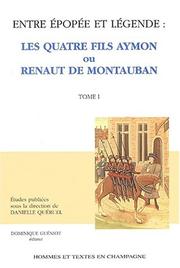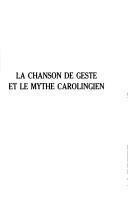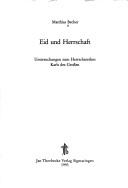| Listing 1 - 10 of 33 | << page >> |
Sort by
|
Book
ISBN: 9780713992434 0713992433 Year: 2019 Publisher: London : Allen Lane,
Abstract | Keywords | Export | Availability | Bookmark
 Loading...
Loading...Choose an application
- Reference Manager
- EndNote
- RefWorks (Direct export to RefWorks)
Charles, king of the Franks, is one of the most remarkable figures ever to rule a European super-state. That is why he is so often called by the French 'Charlemagne', and by the Germans 'Karl der Grosse'. His strength of character was felt to be remarkable from early in his long reign. Warfare and accident, vermin and weather have destroyed much of the evidence for his rule in the twelve centuries since his death, but a remarkable amount still survives.Janet L. Nelson's wonderful new book brings together everything we know about Charlemagne and sifts through the evidence to come as close as we can to understanding the man and his motives. Nelson has an extraordinary knowledge of the sources and much of the book is a sort of detective story, prying into and interpreting fascinating material and often obdurate scraps, from prayerbooks to skeletons, gossip to artwork.Above all, Charles's legacy lies in his deeds and their continuing resonance, as he shaped duchies and counties, rebuilt and founded towns and monasteries, and consciously set himself up not just as King of the Franks, but as the new 'Emperor governing the Roman Empire'. His successors - in some ways to the present day - have struggled to interpret, misinterpret, copy or subvert Charlemagne's legacy. Nelson gets us as close as we can ever hope to come to the real figure, as understood in his own time.
Charlemagne, --- France --- Europe --- Kings and rulers --- History --- Charlemagne --- Charlemagne, - Emperor, - 742-814. --- France - Kings and rulers - Biography. --- France - History - To 987. --- Europe - History - 392-814.
Book
ISSN: 03425991 ISBN: 376961626X 9783769616262 Year: 2004 Volume: 2004/2 Publisher: München : Bayerische Akademie der Wissenschaften,
Abstract | Keywords | Export | Availability | Bookmark
 Loading...
Loading...Choose an application
- Reference Manager
- EndNote
- RefWorks (Direct export to RefWorks)
Charlemagne, --- Coronation --- Coronation. --- Karol Wielki, --- Karl --- Carolus Magnus, --- Shārlmān, --- Charles the Great, --- Karl Velikiĭ, --- Carlo Magno, --- Carlos Magno, --- Karolus Magnus, --- Karl the Great, --- Carlomagno, --- Karl den store, --- شارلمان، --- Charlemagne --- Charlemagne, - Emperor, - 742-814 - Coronation --- Charlemagne (charles i le grand, roi des francs, des lombards et empereur d'occident), 742-814 --- Charlemagne, - Emperor, - 742-814
Book
ISBN: 9782745317728 2745317725 Year: 2009 Volume: 89 Publisher: Paris : H. Champion,
Abstract | Keywords | Export | Availability | Bookmark
 Loading...
Loading...Choose an application
- Reference Manager
- EndNote
- RefWorks (Direct export to RefWorks)
La Chanson d'Aiquin, longtemps tenue pour un rameau mineur, voire suspect, de la geste carolingienne, reste bien méconnue. Or la présente étude y découvre un système sémiotique servant une signification globale, originale et cohérente. L'auteur relance d'abord l'enquête sur les rapports d'Aiquin et de l'Histoire, dont il montre la complexité et l'intelligence, entre s ouvenirs réels de la période viking de la Bretagne et adaptation politique au contexte de la fin du XIIe siècle. Puis, utilisant et testant les outils d'analyse de la technique épique, il se livre à une étude systématique des formes de la Chanson (vers, laisse, formules et motifs), mettant en évidence les faiblesses, mais aussi les aspects singuliers, parfois raffinés, de son art n arratif, rhétorique et lyrique. Enfin, une troisième partie conjoint étude des stéréotypes et approfondissement de l'interprétation, montrant qu'Aiquin exalte non seulement l'autonomie de la Bretagne, mais encore une morale du contemptus mundi finement instillée dans l'ensemble du poème.
Epic poetry, French --- Chansons de geste --- History and criticism --- Charlemagne, --- Romances --- Conquête de la Bretagne --- Breton mediaeval literature --- Epic poetry --- 12th century --- Criticism --- Epic poetry, French - History and criticism --- Chansons de geste - History and criticism --- Charlemagne, - Emperor, - 742-814 - Romances - History and criticism --- Charlemagne, - Emperor, - 742-814

ISBN: 2878251903 2878251911 9782878251906 9782878251913 Year: 2000 Publisher: Langres : Dominique Guéniot,
Abstract | Keywords | Export | Availability | Bookmark
 Loading...
Loading...Choose an application
- Reference Manager
- EndNote
- RefWorks (Direct export to RefWorks)
Chansons de geste --- Renaud de Montauban (Legendary character) --- History and criticism --- Romances --- Charlemagne, --- Renaut de Montauban (Chanson de geste) --- Chansons de geste - History and criticism - Congresses --- Renaud de Montauban (Legendary character) - Romances - History and criticism - Congresses --- Charlemagne, - Emperor, - 742-814 - Romances - History and criticism - Congresses --- Charlemagne, - Emperor, - 742-814
Book
ISSN: 09386432 ISBN: 9783775222013 3775222014 Year: 2012 Volume: 16 Publisher: Hannover Hahn
Abstract | Keywords | Export | Availability | Bookmark
 Loading...
Loading...Choose an application
- Reference Manager
- EndNote
- RefWorks (Direct export to RefWorks)
Carolingians --- Carolingiens --- History --- Sources. --- Histoire --- Sources --- Charlemagne, --- Germany --- Allemagne --- Carolingians - History - Sources --- Charlemagne, - Emperor, - 742-814 --- Germany - History - 843-918 - Sources --- Empire carolingien --- DROIT --- 768-814 (Charlemagne) --- HISTOIRE --- SOURCES --- MOYEN AGE
Multi
ISBN: 2853990540 9782853990547 Year: 1982 Publisher: Aix-en-Provence : Marseille : Université de Provence, Jeanne Laffitte,
Abstract | Keywords | Export | Availability | Bookmark
 Loading...
Loading...Choose an application
- Reference Manager
- EndNote
- RefWorks (Direct export to RefWorks)
Chansons de geste --- Civilization, Medieval, in literature. --- Cycles (Literature) --- Epic poetry, French --- French literature --- Muslims in literature. --- History and criticism. --- Cycles (Literature). --- Civilization, Medieval, in literature --- Charlemagne, --- Romances --- History and criticism --- Littérature médiévale --- French literature - To 1500 - History and criticism. --- Epic poetry, French - History and criticism. --- Chansons de geste - History and criticism. --- Charlemagne, - Emperor, - 742-814 - Romances - History and criticism --- Musulmans --- Charlemagne, - Emperor, - 742-814

ISBN: 2903977003 9782903977009 Year: 1982 Publisher: Saint-Père-sous-Vézelay
Abstract | Keywords | Export | Availability | Bookmark
 Loading...
Loading...Choose an application
- Reference Manager
- EndNote
- RefWorks (Direct export to RefWorks)
Poetry --- Old French literature --- Thematology --- Carlovingians in literature --- Carolingians in literature --- Carolingiens dans la littérature --- Karolingers in de literatuur --- Chansons de geste --- Epic poetry, French --- Civilization, Medieval, in literature --- Myth in literature --- Carolingians --- History and criticism --- Charlemagne, --- Romances --- -Carolingians --- -French poetry --- -Myth in literature --- French literature --- French epic poetry --- French poetry --- Carlovingians --- Carolinians --- Epic poetry --- Legends --- Heldensage --- Charlemagne Emperor --- -Romances --- -History and criticism --- Carolingians. --- Civilization, Medieval, in literature. --- Myth in literature. --- History and criticism. --- Louis, René. --- Histoire et critique --- Charlemagne --- Carolingiens (dynastie) --- Dans la littérature --- Louis, René. --- Karol Wielki, --- Karl --- Carolus Magnus, --- Shārlmān, --- Charles the Great, --- Karl Velikiĭ, --- Carlo Magno, --- Carlos Magno, --- Karolus Magnus, --- Karl the Great, --- Carlomagno, --- Karl den store, --- شارلمان، --- Louis, René --- Louis --- Carolingiens --- Histoire et critique. --- Dans la littérature. --- Dans la littérature. --- Chansons de geste - History and criticism --- Epic poetry, French - History and criticism --- Charlemagne, - Emperor, - 742-814 - Romances - History and criticism --- Charlemagne, - Emperor, - 742-814
Book
ISBN: 9780199686124 9780199591442 019959144X 0191725129 9786613215574 0191616400 1283215578 0199686122 Year: 2011 Publisher: Oxford New York : Oxford University Press,
Abstract | Keywords | Export | Availability | Bookmark
 Loading...
Loading...Choose an application
- Reference Manager
- EndNote
- RefWorks (Direct export to RefWorks)
Beginning shortly after Charlemagne's death in 814, the inhabitants of his historical empire looked back upon his reign and saw in it an exemplar of Christian universality - Christendom. They mapped contemporary Christendom onto the past and so, during the ninth, tenth, and eleventh centuries, the borders of his empire grew with each retelling, almost always including the Christian East. Although the pull of Jerusalem on the West seems to have been strong during the eleventh century, it had a more limited effect on the Charlemagne legend. Instead, the legend grew during this period because of a peculiar fusion of ideas, carried forward from the ninth century but filtered through the social, cultural, and intellectual developments of the intervening years. Paradoxically, Charlemagne became less important to the Charlemagne legend. The legend became a story about the Frankish people, who believed they had held God's favour under Charlemagne and held out hope that they could one day reclaim their special place in sacred history. Indeed, popular versions of the Last Emperor legend, which spoke of a great ruler who would reunite Christendom in preparation for the last battle between good and evil, promised just this to the Franks. Ideas of empire, identity, and Christian religious violence were potent reagents. The mixture of these ideas could remind men of their Frankishness and move them, for example, to take up arms, march to the East, and reclaim their place as defenders of the faith during the First Crusade. An Empire of Memory uses the legend of Charlemagne, an often-overlooked current in early medieval thought, to look at how the contours of the relationship between East and West moved across centuries, particularly in the period leading up to the First Crusade.
Christian legends --- Civilization, Medieval --- Medieval civilization --- Middle Ages --- Civilization --- Chivalry --- Renaissance --- Legends, Christian --- Legends --- History and criticism --- History --- Charlemagne, --- Karol Wielki, --- Karl --- Carolus Magnus, --- Shārlmān, --- Charles the Great, --- Karl Velikiĭ, --- Carlo Magno, --- Carlos Magno, --- Karolus Magnus, --- Karl the Great, --- Carlomagno, --- Karl den store, --- شارلمان، --- History and criticism. --- Civilization, Medieval. --- Civilisation médiévale --- Légendes chrétiennes --- Histoire et critique --- Christian legends - Europe - History and criticism --- Charlemagne --- Francs --- Charlemagne, - Emperor, - 742-814 - Legends - History and criticism --- Charlemagne, - Emperor, - 742-814 --- Charlemagne (empereur d'Occident ; 0742-0814) --- Légendes chrétiennes --- Légendes --- Europe --- Légendes
Book
ISBN: 9066200197 9789066200197 9789066200364 9066200367 Year: 1998 Publisher: Leeuwarden Taal & Teken
Abstract | Keywords | Export | Availability | Bookmark
 Loading...
Loading...Choose an application
- Reference Manager
- EndNote
- RefWorks (Direct export to RefWorks)
Tekst van de Middelnederlandse ridderroman met vertaling in hedendaags Nederlands.
Medieval Dutch literature --- Chansons de geste --- Epic poetry, French --- Renaud de Montauban (Legendary character) --- Translations into Dutch. --- Romances. --- Epic poetry --- French poetry --- Legends --- Heldensage --- French epic poetry --- Renaut de Montauban (Legendary character) --- Rinaldo (Legendary character) --- Rinaldo da Monte Albano (Legendary character) --- Rinaldo di Montalbano (Legendary character) --- Charlemagne, - Emperor, - 742-814

ISBN: 9783799566995 3799566996 Year: 1993 Volume: 39 Publisher: Sigmaringen Thorbecke
Abstract | Keywords | Export | Availability | Bookmark
 Loading...
Loading...Choose an application
- Reference Manager
- EndNote
- RefWorks (Direct export to RefWorks)
Civilization, Medieval. --- Oaths --- Civilisation médiévale --- Serments --- History. --- Histoire --- Charlemagne, --- France --- History --- -Oaths --- Manners and customs --- Vows --- Law and legislation --- Charlemagne Emperor --- -History --- Civilisation médiévale --- SAINT EMPIRE ROMAIN GERMANIQUE --- ALLEMAGNE --- CHARLEMAGNE (CHARLES I LE GRAND, ROI DES FRANCS, DES LOMBARDS ET EMPEREUR D'OCCIDENT), 742-814 --- HISTOIRE --- 8E-9E SIECLES --- HISTOIRE CONSTITUTIONNELLE --- MOYEN AGE --- HISTORIOGRAPHIE
| Listing 1 - 10 of 33 | << page >> |
Sort by
|

 Search
Search Feedback
Feedback About UniCat
About UniCat  Help
Help News
News